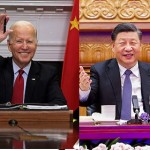When U.S. President Joe Biden and Chinese President Xi Jinping met on November 15 for a virtual summit, Xi greeted Biden with the words, “I’m very happy to meet my old friend.” And thereby hangs a tale.
For countries such as India watching in trepidation as the heads of state of the world’s two most powerful nations meet, it all depends on where the stress is placed in the use of “old friend” – on “old” or on “friend”. This was the first time Biden was coming face-to-face (even if virtually) with Xi since being sworn into office early this year, and since U.S.-China relations nose-dived under the Trump administration. But reassuringly for India, there was little sign of “old friendships” being revived, which would leave new U.S. friends such as India, in the lurch. With the People’s Liberation Army breathing down India’s neck along the Line of Actual Control, the last thing New Delhi would like to see is what Beijing euphemistically calls a “new type of great power relationship”, whereby Washington concedes Asia as China’s exclusive sphere of influence.
However, as things stand, there is minimal prospect of America’s Asian friends being abandoned as an outcome of the Biden-Xi meeting. In fact, hardly any deliverables have emerged in its wake. The main purpose was for the two heads of state to get to know each other and establish a line of communication, or as Biden put it in his introductory remarks, “we never walk away wondering what the other man is thinking”.
One possible outcome, though, is that both countries will begin processing visas for each other’s journalists, according to a report in the state-run China Daily. During the Trump era, Washington imposed restrictions on Chinese journalists, and Beijing retaliated by expelling more than a dozen American journalists. Given the paucity of authentic information and reporting out of China, American newsmen going back to work there is no bad thing at all.
Clearly, though, the Cold War-era honeymoon between the U.S. and China is definitively over. There was no talk of “re-engaging” China or of “repairing” a broken relationship. Biden did reiterate America’s commitment to a free and open Indo-Pacific and indicated that the U.S. position on Taiwan hasn’t changed. But he didn’t depart from other established U.S. positions, bringing up unfair trade practices by China, and the suppression of minorities in Xinjiang. Rather Biden’s pitch, echoed by other Washington policymakers, was that the U.S. had large differences with China, but the two sides had to “manage” their competition so that it didn’t veer into open conflict.
Such conflict, indeed, would be in nobody’s interest, least of all China’s neighbours such as India. If the U.S.-China relationship underwent wild fluctuations during the Trump era, ranging from the Trump-Xi bromance to Trump calling Covid the “China virus” and his aides directly attacking the Communist Party’s rule over China, the attempt now is to put the relationship on an even keel so that both sides understand each other and don’t get overtaken by their own rhetoric. This is sound thinking.
Alongside, a paradigm shift is taking place. As a senior official speaking on background at the summit put it, “unlike previous approaches to policy with respect to China, the Biden administration is not trying to change China through bilateral engagement … Rather we are trying to shape the international environment in a way that is favourable to us and our allies and partners.”
In other words, the pre-Trump U.S. administrations’ policy of engaging China had the implicit assumption that such engagement would nudge China into becoming more like the U.S. Now that the fallacy of such an assumption has been exposed – engagement not only doesn’t achieve intended outcomes but also drives China paranoia and attempts to up-end the liberal international order – it’s best to drop the pretence and acknowledge the big differences with China on values and interests and the great power competition, and move forward from there. A cold peace is better than an inconsistent and unsettled relationship – whether honeymoon pace Nixon-Kissinger or bromance pace Trump – where both sides don’t understand each other.
If this is Cold War 2.0, with similarities to, as well as differences from, Cold War 1.0, then what the Biden administration has in mind is something akin to détente. It’s worth remembering that during periods of détente between the U.S. and the Soviet Union, the two co-operated on space projects, such as the Apollo-Soyuz docking mission undertaken in 1975, which developed compatible rendezvous and docking systems and thus a version of “interoperability” in space. Similarly, there is scope for cooperation between today’s two superpowers on an existential threat faced by mankind: climate change.
Indeed, climate change was a topic of the two leaders’ discussion. Just the previous week the U.S. and China announced that they would work together to slow global warming. If they can follow this up by jointly developing concrete initiatives for doing so, the two rivals would reassure each other, and also the world.
Swagato Ganguly is Consulting Editor, The Times of India and Research Affiliate, Lakshmi Mittal South Asia Institute, Harvard University.
This article was exclusively written for Gateway House: Indian Council on Global Relations. You can read more exclusive content here.
For interview requests with the author, or for permission to republish, please contact outreach@gatewayhouse.in.
©Copyright 2021 Gateway House: Indian Council on Global Relations. All rights reserved. Any unauthorized copying or reproduction is strictly prohibited.


